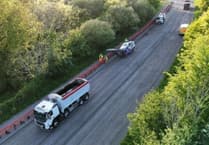A LARGE fin whale has been found washed up on a beach near Hartland Quay in North Devon recently.
The whale — which was considered small at just over ten metres in length, measuring at half the size it could have potentially had grown to, according to the British Divers Marine Life Rescue charity — was found beached by passers by, near Hartland Quay, at around 4pm on March 8.
Fin whales are the second largest animals on the planet, measuring at 25 metres in length if they reach their full size. These animals can be found off the British coast.
Due to high tides since its discovery, the whale has been moved further up the beach, and people are now being advised to stay at least ten metres away from the carcass, due to biohazard risk from direct contact. Dog walkers are also being advised to keep their pets on leads until further notice.
Richard Haste, service manager for waste and recycling at Torridge District Council, said: “The UK Cetacean Strandings Investigation Programme have confirmed that the species is that of a fin whale over ten metres in length. Following high tides, the carcass has moved further up the beach but access is still problematic.
“The council will be erecting signs on access points to the beach warning the public to keep at least ten metres from the carcass. While there is no direct risk to the public from this distance, there is a biohazard risk from direct contact with the carcass or any remnants. Dog owners are also being advised to keep their pets on leads.”
With high tides over the last few days, the council has been monitoring the situation to see if the carcass is ‘taken out to sea by the tides where it is expected to decompose naturally, or can be dealt with more easily’.
He explained: “The Marine and Coastguard Agency have been advised of the council’s plans and have indicated that they may be able to provide further assistance if required.”
Despite people’s fascination over the rarity of this animal being found locally, Devon and Cornwall Police are asking passers by to keep their distance, reminding people that health risks are possible, and that it is illegal to try and remove any parts of the carcass.
A police spokesperson said: “A large fin whale has beached at Hartland Quay. Devon and Cornwall Police asks that members of the public do not approach the whale, as decomposing whales can be dangerous to health. The whale is on the rocks and this area can be dangerous to the public.
“Whales are protected under the Conservation of Habitats and Species Regulations 2010. It is an offence to be in possession of any part of the whale whether alive or dead, and Devon and Cornwall Police will actively be looking to prosecute any persons attempting to remove any parts of the whale. A police wildlife liaison officer has been assigned to the incident; anyone with any information in relation to any offences can call on 101 and quote log 577.”
A spokesperson from the British Divers Marine Life Rescue (BDMLR) charity told the Post: “Fin whales normally measure to 25 metres, so this one was not an old one, but not a calf either.”
He explained that five or six of these whales had been found dead on UK shores last year, and that they often die well out at sea some time before being washed up on a beach.
He added: “It’s not really rare, and it wouldn’t be a surprise for these whales to wash up on beaches in the UK. They normally die at sea and are washed in with the tide. We are a little island and parts of this country are close to very deep waters.”
While a post mortem will not be carried out on the whale, as it is ‘too far gone’, the BDMLR is also reminding the public that it is illegal to take any part of the whale and that the carcass could also carry diseases, so people must keep their distance.
A further strategic review was carried out on Monday, March 13, and the carcass was not taken out to sea by the tide. The council is now looking at alternative ways to dispose of the whale.
Mr Haste added: “Unfortunately the high tides over the last few days have not taken the whale carcass back out to sea. The council are now exploring methods of removal and are in contact with several local companies who have indicated they have the expertise to undertake this work.
“We will also be in contact with the Receiver of Wreck to approve any plans and initiate the process for submitting a claim for the cost of removal. There will be a short delay while the plans are finalised and property costed, but we hope that the work to remove the carcass can begin as soon as this is completed.”



.jpeg?width=209&height=140&crop=209:145,smart&quality=75)
.jpeg?width=209&height=140&crop=209:145,smart&quality=75)
Comments
This article has no comments yet. Be the first to leave a comment.